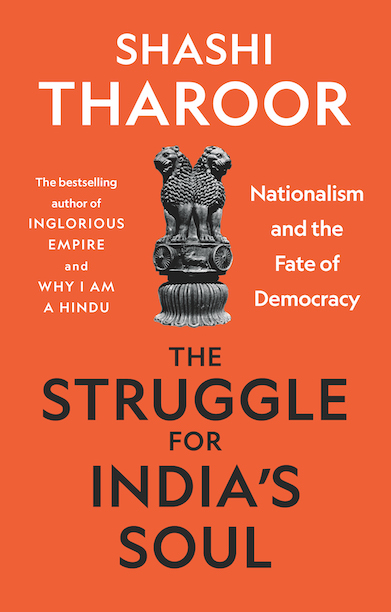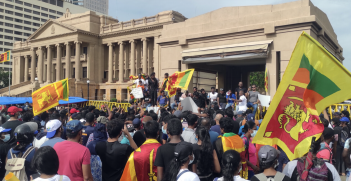Book Review: The Struggle for India’s Soul: Nationalism and the Fate of Democracy

Tharoor provides a scathing criticism of India’s ruling Bharatiya Janata Party (BJP). While Tharoor is a member of the opposition, he nonetheless provides a valuable analysis of the past decade of modern Indian history.
Shashi Tharoor is no stranger to Indian political thought. Education in international relations, a decorated career in the United Nations, and a long political career in India have equipped Tharoor with the ability to comment on various facets of modern Indian history. He has already published several books on issues ranging from India’s colonisation and independence, the formative years of the Indian state formation, to a commentary on Hinduism. Beyond the confines of parliamentary debates and news appearances, Tharoor lives up to his role as member of the opposition party, the Indian National Congress (INC), by providing political commentary on Twitter, often amusing his audience with his extensive vocabulary.
Tharoor, and the INC in general, stand at the opposite end of the political spectrum from Prime Minister Narendra Modi and the BJP. Anyone remotely familiar with Indian politics would be aware that since coming to power in 2014, the ruling government has a focus on ethno-nationalism, often dodging rightful criticism by evoking misguided notions of patriotism.
The Indian political landscape is no stranger to religious politics. Political parties with religious allegiances have existed since before independence. However, the ruling government of India has built a loyal following of supporters by espousing a special cocktail of nationalism that rests on religious exclusion and a misinformed history of India where everyone but the Hindu is demonised. Beyond the obvious issue that such a detrimental turn of politics does not bode well for the future of the nation, the ethno-nationalistic policies of BJP are also unnecessary for a country that has a host of other issues to grapple with first.
A large section of the Indian population is young, qualified, yet woefully unemployed. The COVID-19 crisis during 2021 proved how fragile the health infrastructure of the country is. Yet, the BJP and Modi are favoured by much of the population. Academics and commentators have tried solving the quandary of why people would support a government that might bring the country’s demise. The Struggle of India’s Soul is the newest iteration in the search for such an answer.
The book is divided into six parts. In the first part, Tharoor explores the meaning of patriotism and nationalism by quoting scholars that anyone familiar with political science academia would know , such as Thomas Hobbes, Benedict Anderson, Ernest Gellner, and George Orwell. The second and the third parts carry these concepts into the context of India, where Tharoor brings in the independence struggle and India’s own rich history of national identity formation. The last three parts are what sells the book. Tharoor breaks down each instance where the ruling BJP government has either directly aided or quietly overseen the annihilation of long-standing liberal, democratic, and secular practices in India. The final chapter, especially, is equally compelling and worrisome, as Tharoor presents his case that the BJP government poses a clear danger to the future of India.
The book is extremely eloquent. The pages flow seamlessly from one to the other. The structure of the book facilitates the build of the argument. Tharoor’s opinions are interspersed with humour and personal observations, which makes the book an interesting insight into the author himself. Shashi Tharoor and the victim of his ire, Narendra Modi, are two sides of the same coin. They are both politicians in the Lok Sabha (the lower house of the parliament), albeit on the opposite sides of the aisle. Modi is as eloquent in Hindi as Tharoor is in English. They each have a loyal following from their party supporters.
The book is an enlightening read if one has a good grasp over Indian history and modern Indian political landscape. If one were to use this book as a conduit to understand Indian politics, they would be miserably lost. Tharoor does not seek to explain the entirety of post-independence India to his audience. This is evident in how Tharoor references his previous work to provide contextual background for his arguments.
However sound his opinions are, it would be foolish to not be cognizant of Tharoor’s own political motives. Tharoor’s claim that the INC had “epitomized Indian nationalism” is an insufficient summary of a national struggle borne out two centuries of subjugation, where thousands of Indians unaligned with the INC played a pivotal role in making India what it is today. The book is interspersed with defensive arguments about important members of the opposition and key INC figures such as Rahul Gandhi and Sonia Gandhi. The grandiose claims about the greatness of the Congress Party throughout the book does make one question how the BJP could have gained such a strong foothold if the INC had been as indispensable and effective a government as Tharoor paints it. Tharoor further opines that the rise of criminals contesting in elections is changing Indian politics. This is a strange argument to make given that several members of the Congress party also have criminal cases registered against them.
While elucidating the “ongoing struggle for India’s soul” in the fourth part of the book, Tharoor focuses on factors that have changed the landscape of Indian politics and contributed to the rise of an ethno-national government. His first explanation is that democracy has deepened in India and as a result has led to the rise of a “former underclass,” by which he means people of “modest educational attachment and small-town background” and those with caste reservation. Such “new elites” are “changing power equations in India.” One does not need to read between the lines to detect the blatant show of casteism in such remarks. Casteism continues to haunt the social fabric of India. The cognitive dissonance of arguing for a united nation while partly blaming the underclass is appalling.
Overall, the book is enlightening for those who wish to gain critical insight into the ruling government of India. The arguments are presented in a linear manner, starting with basic concepts of nationalism and patriotism, and ending in the dilemma of the future of India. A fruitful read of the book would be one accompanied by the writing of authors whose political motives are perhaps less overt.
This is a review of Shashi Tharoor, The Struggle for India’s Soul: Nationalism and the Fate of Democracy (Hurst Publishers, 2021). ISBN:9781787385597.
Arushi Ganguly is a Masters of International Relations (Advanced) student at the Australian National University. Her research focuses primarily on feminist international relations.
This article is published under a Creative Commons Licence and may be republished with attribution.





